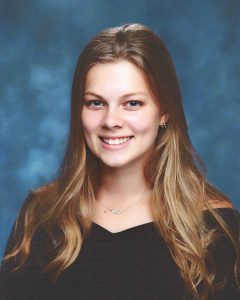 FFRF awarded Zoe $750.
FFRF awarded Zoe $750.
By Zoe Lilly
At the age of 14, I made a decision that would shape the course of my life: I embraced atheism. Raised in a religious household, my departure left me feeling like an outsider.
To mask my divergence, I continued presenting myself as a Christian to my family and peers. However, as I grew older and explored the intricacies of my beliefs, I stumbled upon the statistical landscape of my generation. I found comfort in the shared experience of atheism and agnosticism among my Gen Z peers.
I was considering this when I began to think of a short poem, a reflection on our collective journey, the generational disparity in perspectives and meaning:
“How I envy the Boomer.
The flower lost its power
When we found it wasn’t ours,
So we suffer the hours
Desperate to unsee
What the Boomer never saw.”
This poem is meant to speak to the contrast between the spiritual passion of previous generations and the existential disillusionment pervasive among today’s youth. While our parents and their parents enjoyed the comforts of faith and divine purpose, we have been forced to confront the harsh reality of our existence. We are the inheritors of a rapidly evolving technological landscape and a world that is burning before our eyes. The flower that was Hope lost its power.
In the face of this existential crisis, we are confronted with a choice to address the void. Our pursuit of meaning becomes a relentless endeavor, a daily struggle to find purpose in the absurd nature of existence. Because when times get hard, which they often do, our willingness to hope is not a constant, it undulates with the ripples of our circumstances and emotions, and as a result, we are in a constant and vulnerable state of uncertainty.
But amidst the despair, a glimmer of hope emerges from the realization of our agency. Freed from the shackles of eternity, we are empowered by mortality. We are now guided by compassion, empathy and an appreciation for the fleeting beauty of life. The care that was meant for the afterlife is now meant for this life. This life that’s so absurd is our only, so we fight for what we believe in, we take ourselves less seriously and we realize our interdependence.
In embracing our insignificance, we find liberation. Within the finitude of our mortality, we can discover the value of life, the beauty of its impermanence, and its fleeting moments.
While our journey may be tainted with uncertainty, it is also inspired by a sense of inherent value, forged not in religion, but in the depths of humanity, a love for this life and our planet. My generation realizes one thing that previous generations missed: we all need each other. So, while the flower of divine faith that guided generations before us lost its power, our generation found a new hope: in existence, nature, community and a raging passion for this life.
Zoe, 21, attends the University of Virginia, where she is majoring in human biology after earning her associate’s degree in applied science from Laurel Ridge Community College.
“I was awarded Outstanding Science Graduate of the Year [at Laurel Ridge], given to one student graduating with a degree in the sciences,” Zoe writes. “I ultimately plan to attend optometry school and become a practicing pediatric optometrist.”
